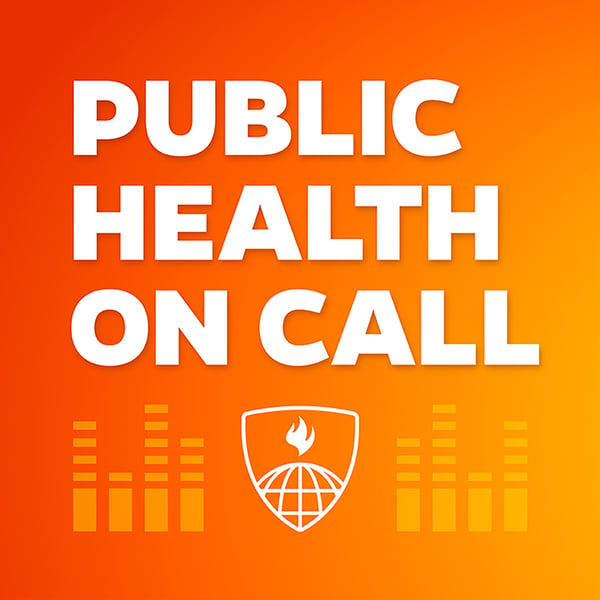855 - Can The CDC Communicate More Transparently With The Public?
Public Health On Call
The Johns Hopkins Bloomberg School of Public Health
4.8 • 620 Ratings
🗓️ 21 February 2025
⏱️ 18 minutes
🧾️ Download transcript
Summary
About this episode:
During the pandemic, CDC recommendations about masking and other issues were the source of controversy. Some have asked whether the agency can better communicate the basis of its recommendations — and even seek public input along the way—to increase public understanding and acceptance. In today’s episode, Johns Hopkins cardiologist Dr. Joseph Marine and Dr. Peter Lurie of the Center for Science in the Public Interest join the podcast to discuss how the CDC can communicate more transparently to build more public trust.
Guests:
Dr. Joseph Marine is a cardiologist and a professor of medicine at Johns Hopkins.
Dr. Peter Lurie is the president and executive director of the Center for Science in the Public Interest, and a former Associate Commissioner of the Food and Drug Administration.
Host:
Dr. Josh Sharfstein is vice dean for public health practice and community engagement at the Johns Hopkins Bloomberg School of Public Health, a faculty member in health policy, a pediatrician, and former secretary of Maryland’s Health Department.
Show links and related content:
-
Applying Class of Recommendations and Level of Evidence to Clinical Strategies, Interventions, Treatments, or Diagnostic Testing in Patient Care—American Heart Association
-
Building a Better CDC—Public Health On Call (April, 2023)
Contact us:
Have a question about something you heard? Looking for a transcript? Want to suggest a topic or guest? Contact us via email or visit our website.
Follow us:
Transcript
Click on a timestamp to play from that location
| 0:00.0 | Welcome to Public Health On Call, a podcast from the Johns Hopkins Bloomberg School of Public Health, |
| 0:05.9 | where we bring evidence, experience, and perspective to make sense of today's leading health challenges. |
| 0:16.3 | If you have questions or ideas for us, please send an email to public health question at jhhhu.edu. |
| 0:23.8 | That's public health question at jhhu.edu for future podcast episodes. |
| 0:31.2 | Hi listeners, it's Lindsay Smith-Rogers. |
| 0:34.1 | When the U.S. Centers for Disease Control and Prevention makes a recommendation to the public, |
| 0:38.3 | how much evidence supports it? How was the recommendation developed? Today, a conversation on a long-standing |
| 0:44.7 | issue, whether the CDC can communicate with greater transparency with the American public. |
| 0:50.5 | It's a topic of special interest to Dr. Joseph Marine, a cardiologist at Johns Hopkins, and Dr. Peter Lurie of the Center for Science and the public interest. |
| 0:59.4 | They joined Dr. Josh Starfstein to discuss alternatives for the CDC to enhance public trust. |
| 1:05.3 | Let's listen. |
| 1:06.5 | Dr. Joseph Marine, Dr. Peter Lurie, thank you so much for joining me today in Public Health on call. |
| 1:11.9 | We're going to talk about the Centers for Disease Control and Prevention |
| 1:14.7 | and ways that the agency could become more transparent in its communications with the public. |
| 1:22.0 | I'd like to start by asking each of you to introduce yourself a little bit about your background and how you |
| 1:29.0 | come to this issue of transparency at the CDC. Dr. Marine, I'll start with you. Well, good morning. |
| 1:36.6 | Thank you, Josh, for having me on your program. I'm Joe Marine. I'm a cardiologist. At Johns Hopkins, |
| 1:41.5 | I've been on the faculty for 20 years. I've also been very involved |
| 1:44.8 | with my professional society, and I've long been interested in the issue of bioethics about |
| 1:49.8 | medical communication, both at the patient level and in the society level, and I've been very |
| 1:54.7 | involved with my society's guideline process and how to communicate those recommendations |
| 1:59.9 | to the public and also to the scientific |
... |
Please login to see the full transcript.
Disclaimer: The podcast and artwork embedded on this page are from The Johns Hopkins Bloomberg School of Public Health, and are the property of its owner and not affiliated with or endorsed by Tapesearch.
Generated transcripts are the property of The Johns Hopkins Bloomberg School of Public Health and are distributed freely under the Fair Use doctrine. Transcripts generated by Tapesearch are not guaranteed to be accurate.
Copyright © Tapesearch 2025.

